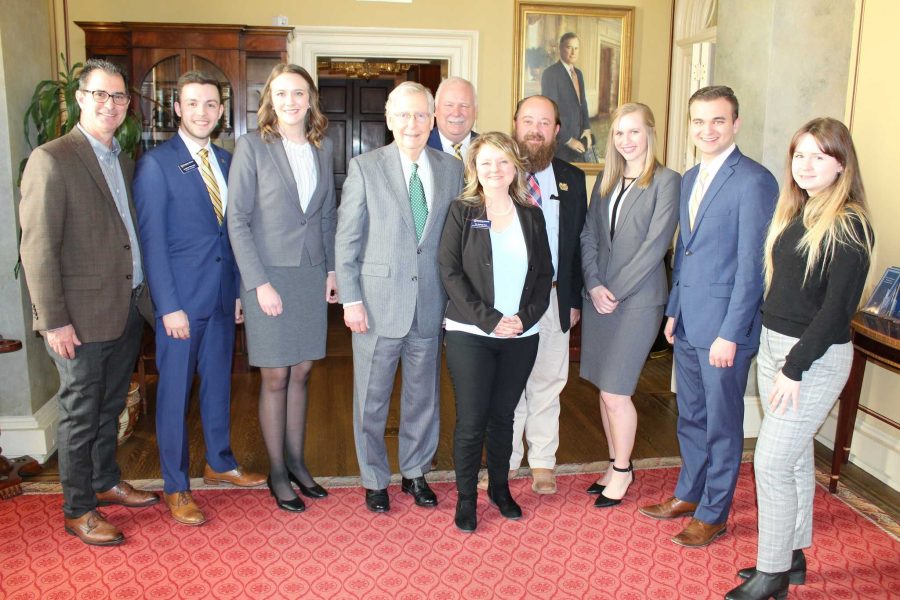Story by Cady Stribling
Staff Writer
cstribling1@murraystate.edu
The Board of Regents approved the Center for Agricultural Hemp on March 1.
The center will focus on topics including agronomy, cannabinoid science, agribusiness, economics and finance, animal feeds and fibers, education, hemp policy, workforce development and agricultural hemp farming, according to the Murray State press release.
Murray State is the first university in the United States to implement research and partner with companies to help grow the hemp industry.
Tony Brannon, dean of the Hutson School of Agriculture, said the center is an opportunity for the University to serve the region.
“It is intended to be an interdisciplinary effort among programs on our campus and among industry in our region,” Brannon said.
The Hutson School of Agriculture and its partners will administer the center. The three foundational partners that will work with Murray State include CV Sciences, GenCanna Global and Hemp Hardwood, according to the press release.
“We at GenCanna believe that Murray State University, situated in a natural hub for the hemp industry, can provide a ‘Kentucky Proud’ solution that can benefit the entire nation,” GenCanna Global President Steve Bevan said. “Helping farmers farm improves rural economies through jobs and increased output, both stemming from increased research and investment.”
In 2014, Rep. James Comer, R-District 1, requested Murray State be the first university in Kentucky to conduct research on hemp.
Sen. Mitch McConnell, R-Ky, secured the pilot programs in the 2014 farm bill that allowed for research at Murray State to take place, according to the press release from McConnell’s office.
Students and staff also discussed the center with McConnell on March 6.
“[Murray State] has been on the cutting edge of hemp research ever since I secured the pilot programs in the 2014 farm bill,” McConnell said. “Now that hemp is fully legal, these students and faculty are expanding the limits of hemp’s bright future through their impressive research.”
Comer said he believes Murray has the best agriculture program in the state, and the University is a quality school for agricultural production education.
“The passage of the 2019 farm bill was the final step in bringing industrial hemp into the mainstream of America’s agriculture commodities,” Comer said. “Murray State was the very first university in America to participate in the very first hemp pilot program. Today, the Murray State Hutson School of Agriculture is the leading industrial hemp school in the nation.”
Student Regent and Student Government Association President J.T. Payne said through the Center for Agricultural Hemp, students will gain valuable research and learning opportunities.
Payne also said hemp is predicted to be a key part of Kentucky’s agricultural economy, and students are now able to be a part of the new changes in industrial hemp.
“Current students are witnessing industrial hemp being brought to the forefront of United States agriculture, which could go down in history as one of Kentucky’s most impactful economic cash crops – similar to the well-known crop of tobacco, which has seen a production decline in recent years,” Payne said.
Brannon said there are eight jobs posted for the new $40 million GenCanna operation in Mayfield. He hopes to connect Murray State students and the partners collaborated to design a support curriculum. The partners are also interested in hiring interns.
However, Brannon said the process for approval has not been easy. The main challenge was the restrictions within the pilot research program authorized by the 2014 farm bill.
Aside from research, hemp was illegal until the 2018 farm bill passed in December. Brannon said it is now an official legal agricultural commodity.
Comer also faced political challenges to help establish this project. Recently, the Food and Drug Administration and pharmaceutical companies wanted to increase regulations on hemp.
“For better or worse, my name will always be associated with hemp because I was the first elected official in America to successfully pass legislation making hemp legal, and writing and implementing the nation’s first hemp policies,” Comer said. “I always read stories about hemp and am constantly fielding questions from farmers about hemp, investors looking to take a risk on hemp, and economic development officials inquiring about the credibility of certain hemp companies. So I monitor the movement of hemp as close as anyone in the world right now because I sincerely want to see it succeed as an alternative crop for farmers and as a job creator in rural communities.”
Brannon said the Center for Agricultural Hemp pushes Murray State to be among the leaders to reinvent hemp.
“Stay tuned,” Brannon said. “The legalization through the farm bill has taken the blinders off this race horse.”




























































































